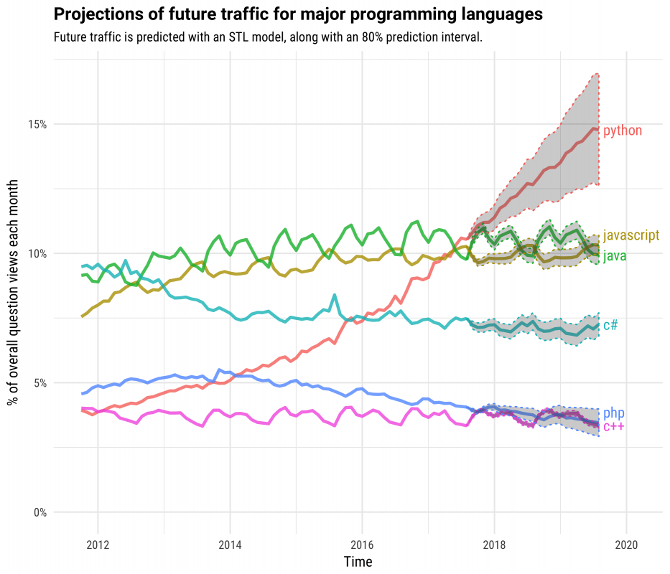Working out which programming languages to learn can be a thankless task. Arguments rage as to which language is king and which ones are flawed. No definitive answer exists as to which among them is "best," although there are good reasons to learn Python.
Whether you're a beginner or a Python veteran, here are several reasons why Python is the programming language of the future.
1. Python Is Popular
Popularity may not seem a useful metric with which to measure value. Consider then, that in 2017 more people searched for Python than Kim Kardashian in America.
To many of you, this will be a fairly inconsequential piece of trivia. It does, however, show a real change in interest in programming as a whole. Python first appeared in 1991, written as a successor to the ABC language. When creator Guido van Rossum was working on the language, he could have no idea that it would end up so remarkably popular.
Its success cannot be put down merely to a growing interest in coding as a whole in recent years either. Last year, Stack Overflow analyzed data on the growth of programming languages based on traffic data from high-income countries. From this data, they state that "Python has a solid claim to being the fastest-growing major programming language."
Python has exploded in popularity in recent years, and according to these predictions, it shows no sign of stopping. By why this sudden surge in popularity? While there is no single reason, there are a few worth considering.
2. Big Name Companies Use Python
Python is already used by some of the biggest names in tech, along with some less likely but equally-impressive users.
Uber, PayPal, Google, Facebook, Instagram, Netflix, Dropbox, and Reddit all use Python in their development and testing. Moreover, Python is also used extensively in robotics and embedded systems (it can even be used to control Arduinos). Even legacy systems written in C and C++ are easy to interface with Python.
Anywhere that data analysis is required, Python and its assorted libraries shine. Goldman Sachs is one of several large financial institutions using Python to express the massive amounts of data they generate. This alone is an area Python is well suited to, and increasingly this field is making use of machine learning.
3. Machine Learning With Python
There is no escaping how important machine learning is in the modern world. It already curates your internet experience. Trained neural networks are doing everything from moderating social networks to driving cars. The field has moved forward incredibly quickly in recent years as processing power has improved. The potential for machine learning is vast, and not even close to fulfilled.
What has this got to do with Python? A lot. While there are libraries designed to work with other popular languages, Python is the de facto language of machine learning. Notably, Google's TensorFlow works primarily with Python. Almost every course on neural networks uses Python. The data analysis and parsing required for machine learning go well with Python, and its libraries.
Machine learning as a skill is in greater demand every day. A good grasp of the Python programming language puts you a step ahead of others learning it from scratch. That said, prepare for a considerable amount of mind-bending mathematics and data analysis before starting your new career!
4. Python Is Well Supported
Due to its meteoric rise in popularity, Python has good online support at almost every level. As a popular language with beginners, explanation of core programming concepts features alongside syntax in many tutorials.
Even sites like Stack Overflow more often than not provide help with fundamentals at a novice level. We've also got help on Python, like how to create, import, and reuse modules. On the other end of the spectrum, programmers working on complex and particular problems are likely to find support where historically they might not have.
Online community support for all programming languages has been growing for years. Python has benefited from this, and above all its massive surge in popularity.
5. Python Is the Language of Education
The use of computers in education has changed radically in recent years. In the past, students may have learned to type along with basic presentation skills if they were lucky. Nowadays, technology use features in many forms of education, with coding taking its rightful place in many classrooms worldwide.
Python is an easy to read programming language, designed with simple descriptions and common sense syntax. User experience is a high priority. This makes it perfect to teach kids.
Alongside the clarity the language brings, it is the standard programming language for the Raspberry Pi, a computer designed with education in mind.
Still not convinced? There is a version of Minecraft that can teach you Python.
This extends well beyond younger years education too. Universities teach Python, not only in computer sciences but also to mathematics students. Additionally, Matplotlib (a popular Python library) is used in subjects at all levels to express complex data. Python is one of the fastest growing languages on Codecademy [Broken URL Removed] too, and as a result is easy to learn remotely.
6. Python Is Free!
Saying Python is free may not make much sense at first glance. After all, no matter which language you decide to pursue, simply using the language doesn't cost anything.
Python is free in a different sense, in that it is Open Source. The Python Project was until recently still led by its creator Guido van Rossum. It is entirely Open Source and GPL compatible. Python's commitment to these ideals might not strike you as important, but open source software has already changed the world. Python's no-strings-attached status makes it a perfect tool for all to use.
Start Learning Python If You Haven't Already
Python is a great language, and there are more places than ever to learn it. You can even install and code Python on Android. If this article has piqued your interest, you might find our Python Programming FAQ a good next stop!


